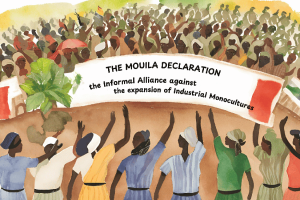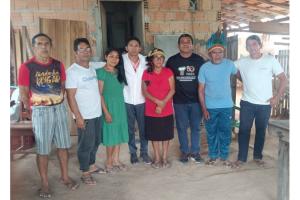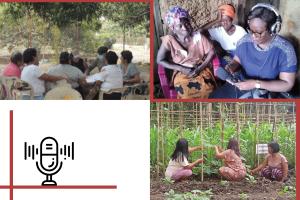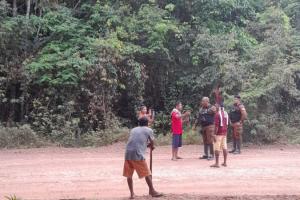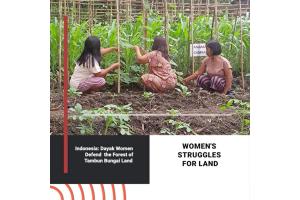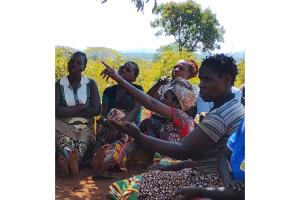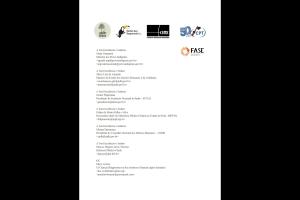The just-released “Mouila Declaration” is a message of resistance, solidarity and unity from communities and grassroots organisations of the Informal Alliance against the expansion of Industrial Monocultures.
Large-Scale Tree Plantations
Industrial tree plantations are large-scale, intensively managed, even-aged monocultures, involving vast areas of fertile land under the control of plantation companies. Management of plantations involves the use of huge amounts of water as well as agrochemicals—which harm humans, and plants and animals in the plantations and surrounding areas.
Bulletin articles
15 December 2024
Other information
15 December 2024
Meticulous research conducted by the New Social Cartography of the Amazon Project in conjunction with traditional communities in the upper Acará River area over the course of five years has resulted in the dossier “Indígenas Turiwara Tembé no alto rio Acará: conflitos étnicos e territoriais”. This outstanding work describes in detail the history and resistance struggles of traditional communities in this part of Pará, proving that the Turiwara Tembé belong in the territory they have demanded for many years.
Multimedia
25 November 2024
On the International Day for the Elimination of Violence against Women, WRM is sharing the podcast "Women’s Struggles for Land", which we have jointly produced with women's organizations and networks from Mexico, Sierra Leone and Indonesia.
Articles
1 November 2024
In the upper Acará River in Pará, in the Brazilian Amazon, Turiwara indigenous people are defending their territory against the oil palm monoculture company Agropalma, that invaded the lands. The Turiwara fear for their lives due to the presence of company guards and other heavily armed people, frightening them.
Bulletin articles
24 October 2024
The Conference of the Parties (COP16) to the Convention on Biological Diversity (CBD) is being held from October 21st to November 1st in Colombia. This initiative has failed in its goal of halting the alarming loss of biodiversity. For 30 years, instead of putting an end to extractive companies' destruction, the CBD's proposals have worsened the situation – through actions that have undermined both the sovereignty of Indigenous Peoples and communities, and their ability to remain in the territories they inhabit and protect.
Bulletin articles
24 October 2024
This article tells the story of a Podcast that is being jointly launched with Solidaritas Perumpuan, a feminist organisation from Indonesia. This espisode is the third in the series “Women’s struggles for land”, produced by WRM together with organisations from different countries. This one tells the story of women's resistance to oil palm plantations, REDD and a large-scale project for food production (Food Estate) in three villages in Central Kalimantan.
Bulletin articles
24 October 2024
The company Sequoia has obtained a lease over 60,000 hectares for a eucalyptus monoculture project in the Haut-Ogooué province, Gabon. Meanwhile, statements from communities and a survey of more than 1,400 people from the impacted region reveal a total rejection of this plantation project. Additionally, Gabonese government and parliamentary authorities have openly expressed an unfavorable position on the project.
Bulletin articles
24 October 2024
In Congo-Brazzaville, tree planting projects intended for carbon markets have proliferated over the past four years. This concerns large-scale developments of monocultures initiated by oil companies under the seductive term of carbon neutrality and promises of job creation for communities. But in reality, they are neither a solution to the climate crisis nor a benefit for the communities of Congo.
Bulletin articles
24 October 2024
Besides the direct impacts on communities’ lives, eucalyptus monoculture plantations represent absurd and obscene inequality. A group of 45 community people with whom we spoke was shocked to learn that it would take them 2,300 years of non-stop work to collectively earn the same amount that a single Portuguese family, one of the owners of the plantation company they work for, earned in one single year from the profits of their shares in the company.
Action alerts
10 October 2024
We call groups, organizations and movements to support this letter in solidarity with the farmers defending their territory against the attempts of Wilmar International company to turn their rice fields into industrial oil palm plantations.
Action alerts
5 September 2024
National and international organizations sent an letter to Brazilian authorities to demand urgent protection for the Turiwara indigenous people of the upper Acará River, in Pará, who are suffering violence and serious threats from Agropalma company.
Action alerts
23 August 2024
Since Monday, 22 August, the Turiwara people in the municipality of Tailândia, in the Brazilian Amazon state Pará took back their territory, illegally in the hands of the industrial oil palm company Agropalma.
